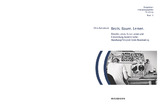Citation link:
http://dx.doi.org/10.25819/ubsi/10211Files in This Item:
| File | Description | Size | Format | |
|---|---|---|---|---|
| Dissertation_Kattenbeck_Chris.pdf | 4.14 MB | Adobe PDF |  View/Open |
| Dokument Type: | Doctoral Thesis | metadata.dc.title: | Beats. Bauen. Lernen. | Title addition: | Manifestation, Konstitution und Entwicklung künstlerischer Handlungsfähigkeit beim Beatmaking | Other Titles: | Manifestation, constitution and development of artistic agency in beatmaking | Authors: | Kattenbeck, Chris | Institute: | Department Kunst und Musik | Free keywords: | Musikpädagogik, Hip-Hop, Beatmaking, Qualitativ-empirische Forschung, Hip Hop, Hip Hop production, Music education, Qualitative empirical research | Dewey Decimal Classification: | 780 Musik | GHBS-Clases: | KII | Issue Date: | 2022 | Publish Date: | 2022 | Source: | Münster : Waxmann, 2022. - ISBN 978-3-8309-4586-4 | Abstract: | Zu Beginn der 1980er Jahre entsteht innerhalb der Hip-Hop-Kultur in den USA das Beatmaking – eine Musikpraxis, die auf dem kreativen Umgang mit bereits vorhandenem Klangmaterial basiert und hauptsächlich in informellen Kontexten ausgeübt wird. In den letzten 40 Jahren hat sich das Beatmaking in enger Verbindung mit musik- und medientechnologischen Entwicklungen global verbreitet und vielfältig ausdifferenziert. Dabei hat es vor allem im Bereich der populären Musik in musikalisch-ästhetischer und technisch-praktischer Hinsicht maßgebende Impulse gesetzt. In seiner qualitativ-empirischen Studie geht Chris Kattenbeck der Frage nach, was es bedeutet, als Beatmaker*in künstlerisch kompetent zu handeln, welche Fertigkeiten und Kenntnisse dafür nötig sind und wie diese erworben und entwickelt werden. Damit liefert er grundlegende Erkenntnisse über eine bislang kaum erforschte Musikpraxis und die mit ihr verbundenen künstlerischen Strategien und Techniken, ästhetischen Ziele und Vorstellungen, Wissensformen und Lernpraktiken. Dabei zeigt sich unter anderem, dass bestimmte in der Musikpädagogik vorherrschende Verständnisse – etwa von Musiklernen oder Musiktheorie – ungeeignet sind, das Beatmaking adäquat zu erfassen. Die Studie bietet daher nicht zuletzt Anlass, diese Verständnisse zu hinterfragen und neu zu konzeptualisieren, um mit der Vielfalt musikalischer Praxen in Zukunft angemessen umgehen zu können. At the beginning of the 1980s, beatmaking emerged within hip-hop culture in the U.S. - a musical practice based on the creative use of already existing sound material and practiced mainly in informal contexts. In the last 40 years, beatmaking has spread globally in close connection with developments in music and media technology and has become diversified in many ways. Especially in the field of popular music, beatmaking has set decisive impulses in musical-aesthetic and technical-practical respects. In his qualitative-empirical study, Chris Kattenbeck explores the question of what it means to act as an artistically competent beatmaker, what skills and knowledge are necessary for this, and how these are acquired and developed. In doing so, he provides fundamental insights into a hitherto hardly explored musical practice and the artistic strategies and techniques, aesthetic goals and ideas, forms of knowledge and learning practices associated with it. Among other things, it shows that certain prevailing understandings in music education - of music learning or music theory, for example - are inadequate to adequately capture beatmaking. Therefore, the study offers not least reason to question these understandings and to reconceptualize them in order to be able to deal appropriately with the diversity of musical practices in the future. |
Description: | Finanziert aus dem Open-Access-Publikationsfonds der Universität Siegen für Monografien |
DOI: | http://dx.doi.org/10.25819/ubsi/10211 | URN: | urn:nbn:de:hbz:467-23005 | URI: | https://dspace.ub.uni-siegen.de/handle/ubsi/2300 |
| Appears in Collections: | Geförderte Open-Access-Publikationen Hochschulschriften |
This item is protected by original copyright |
Page view(s)
494
checked on Nov 24, 2024
Download(s)
534
checked on Nov 24, 2024
Google ScholarTM
Check
Altmetric
Items in DSpace are protected by copyright, with all rights reserved, unless otherwise indicated.

